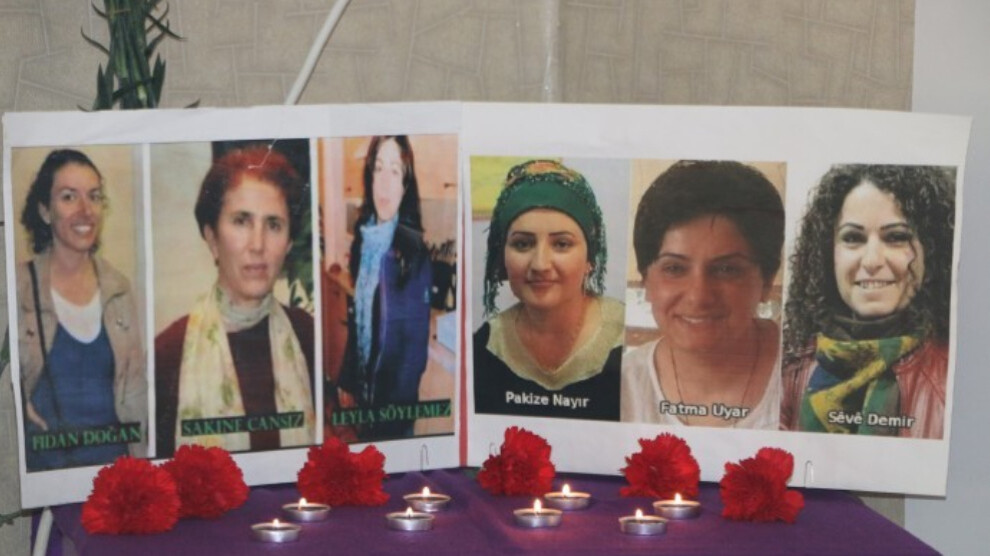Torch of resistance lit by 6 Kurdish women goes from hand to hand
Women resisting dictators are seen as a threat by states, DEM Party Women's Council Spokesperson Halide Türkoğlu said, “The massacres that took place on January 4 and 9 were against revolutionary women.”

MEDİNE MAMEDOĞLU- AXÎN BAHAR
Amed (Diyarbakır)- Throughout history, women have led revolutions and uprisings such as the French Revolution, the October Revolution in Russia, the Zapatista uprising and many more.
The struggle of Kurdish women in four parts of Kurdistan for identity, freedom and equality has revealed that the 21st century is the “century of women”.
“A country cannot be free unless the women are free,” Kurdish leader Abdullah Öcalan said, paving the way for the Kurdish Women’s Freedom Movement to spread. As Kurdish women struggle for freedom, they face double oppression.
On January 9, 2013, Sakine Cansız (Sara), one of the founders of the PKK, Fidan Doğan (Rojbîn), Paris Representative of the Kurdistan National Congress (KNK), and Leyla Şaylemez (Ronahî) were murdered in Paris by Ömer Güney, a gunman of the National Intelligence Organization of Türkiye.
During the 24-hour curfews declared in the Silopi district of Şırnak province between 2015 and 2016, Sêvê Demir, member of the Democratic Regions Party (DBP) Assembly, Pakize Nayır, Co-chair of Silopi People's Assembly, and Fatma Uyar, activist of the Free Women's Congress (KJA) were killed on January 4, 2016 by Turkish forces.
However, the massacres committed by the Turkish state could not prevent the torch lit by women; the torch of resistance lit by these six Kurdish women goes from hand to hand.
Sakine Cansız was born in 1958 in Dersim’s Tatxal village, to an Alevi Kurdish family. She had seven siblings and grew up listening to the stories about the Dersim massacre. Her search for truth began when she was very young. In 1971, she began to take part in revolutionary activities. On November 27, 1978, the Kurdistan Workers' Party (PKK) was founded and Sakine Cansız was one of the founders of the PKK. In 1979, she was arrested in Xarpêt (Elazığ) along with many of her friends. During the 1980 Turkish coup d'état, she was imprisoned in the Diyarbakır military prison, known as Prison No.5. She became a symbol of resistance in the prison.
She fought against torturers in prisons in Xarpêt (Elazığ), Meletî (Malatya), Amed (Diyarbakır), Çanakkale and Bursa. After her release in 1991, she stayed in Palestine and Syria, participating in congress and conferences of the PKK and the Kurdish Women’s Movement. In the mid-1990s, she went to Europe and took part in revolutionary acitivities until she was murdered in 2013.
Leyla Şaylemez
Leyla Şaylemez was born on January 1, 1988 in Mersin, to a Kurdish family, when the Halabja Massacre took place. She spent her childhood in Mersin until her family moved to Germany in 1994. She had seven siblings. In 2008, she began to take part in revolutionary activities. Then, she became a representative of the young Kurdish movement in France. She was 25 years old when she was murdered in Paris on January 9, 2013.
Fidan Doğan
Fidan Doğan was born on January 17, 1982 in Elbistan, Maraş. Since her family went to France after the Maraş massacre, she lived with her aunt and grandparents until she was nine years old. Then, she went to France to live with her family. She took part in Kurdish revolutionary activities when she was very young. When Kurdish leader Abdullah Öcalan was brought to Türkiye on February 15, 1999, she took part in the Kurdish Freedom Movement actively.
In 2012, she became the representative of the Kurdistan National Congress (KNK) in Paris. She carried out many diplomatic activities in European countries until she was murdered on January 9, 2013 in Paris.
Sêvê Demir
Sêvê Demir was born in the Şûtê (Şenocak) village of Mardin’s Stewr (Savur) district. In the 90s, she was displaced first to Amed (Diyarbakır) and then to Manisa due to intensified repression of the Turkish state. In 2002, she participated in politics. When the Free Women's Democratic Movement (Demokratik Özgür Kadın Hareketi, DÖKH) was formed in 2003, she took part in the women’s freedom movement. In 2009, she was arrested in Nusaybin and transferred to the E-type prison in Diyarbakır.
After her release, she started working in Mêrdin and Şirnex as a member of the Democratic Regions Party (DBP) Assembly. On January 4, 2016, she was killed by the Turkish forces during the 24-hour curfews declared in the Silopi district of Şırnak province.
Fatma Uyar
Fatma Uyar was born on August 28, 1988 in Şırnak’s Dihok village as the second child of a family of seven children. In the 2000s, she began to take part in political activities. In 2009, she was arrested and spent five years behind bars. After her release in 2010, she carried out activities as an activist of the Free Women's Congress (KJA).
Pakize Nayır
Pakize Nayır was born in 1990 in Silopi’s Ziristan village. When ISIS attacked Kobanê in 2014, she joined vigils started against ISIS attacks on Kobanê. Following the declaration of self-governance in Silopi, she started serving as Co-chair of Silopi People's Assembly. She was killed on January 4, 2016 by Turkish forces during the 24-hour curfews declared in the Silopi district of Şırnak province.
“The struggle of the murdered women spreads everywhere,” said Halide Türkoğlu, Spokesperson of the Peoples' Equality and Democracy Party (DEM Party) Women’s Council. “Women fighting for freedom were targeted in the massacres. Women resisting dictators are always seen as a threat by states. The massacres that took place on January 4 and 9 were against revolutionary women. Despite all the attacks, the struggle of the Kurdish people and women has become universal. We must talk about the freedom of Mr. Abdullah Öcalan by lifting the isolation imposed on him. We must struggle more to have a peaceful life with dignity.”

